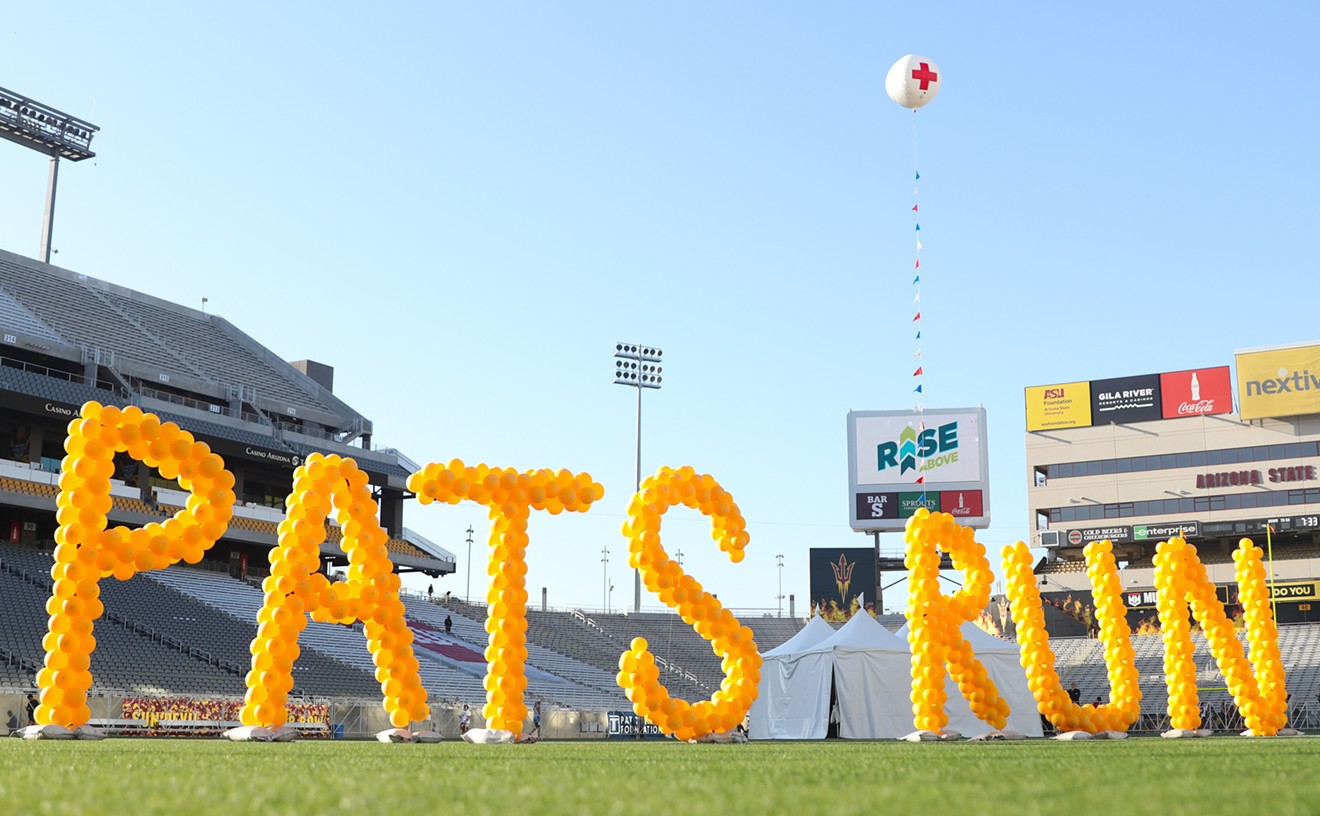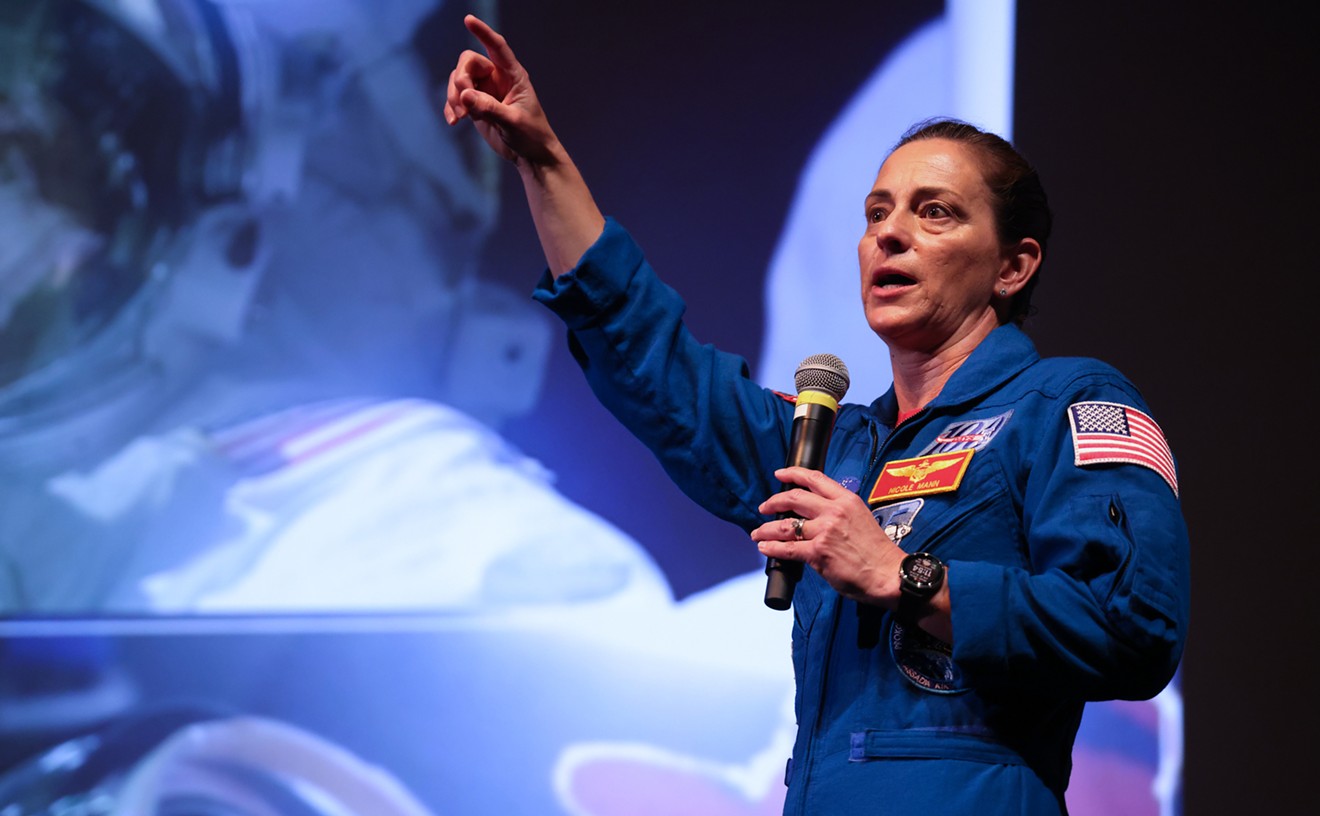Theatre League had, in its first two shows of the season, used a Virtual Pit Orchestra (VPO) to augment its live players. VPO combines digital sampling and computer effects with prerecorded music to enhance the performances of other musicians. Theatre League's decision to use VPO for its October production of Evita led to a boycott of the show by Valley musicians. The performance was leafleted by players who feared that the use of a virtual orchestra would cost them future work.
While the use of electronic music is becoming popular for many local and regional theaters, the technology is still new, and the bugs haven't been worked out. Theatre League producer Mark Edelman defended the technology, claiming that it offers theatergoers "the full, rich sound you'd hear in a Broadway theater."
Edelman points out that every theater production uses modern technology. "We've merely supplemented our musicians with the latest in musical enhancement," he says. "If there's a problem, it's not that we chose this technology, but that we were among the first to use it, before it was perfected."
Musicians who've been replaced by sequencers are less prosaic about the advantages of virtual orchestration.
"This technology is a threat to our livelihood, and to artistic integrity in general," says L.A. percussionist Mark Converse, who was the first musician to turn down a Theatre League gig in protest of the company's use of VPO. Converse leafleted the troupe's L.A.-area productions, wrote letters to the editor of local papers and conducted interviews with local media. He told them that the music being played at Evita was inferior and an insult to theater audiences, an opinion shared by most critics who covered the performance.
"The decision to use a machine in place of people is based in simple greed," he claims. "They're saying, 'We don't need to pay all these guys to play music. We'll rent a machine.' But the interaction that needs to happen between musicians and actors doesn't happen with a virtual orchestra."
Jerry Wayne Harkey, long considered the dean of local musical theater directors, says Edelman is wrong in his assertion that other theater companies are using the same VPO technology as has been used here. "This is not the technology that Broadway is using. There's an enormous interpretive and artistic difference between sequenced music and live music."
Harkey, who was hired to assemble the orchestra for Evita, was later asked to drop certain players from their contracts. "Once I heard that it was because [Edelman] was planning to use a virtual orchestra, and heard the complaints from other musicians, I found it necessary to drop out of the show altogether," says Harkey. He did, however, attend the Evita demonstration, a plastic rose shoved into his jacket lapel to protest the artificial music issuing from the orchestra pit.
Christina Steffen, a flutist who was instrumental in organizing the Phoenix protest against Evita, was there that night, too. Steffen and her husband, who's also a musician, turned down the chance to play in Evita. "We took a financial loss because we felt this was an important issue," she says. "We went to opening night and handed out flyers that explained that the audience was about to hear music that had been stored on a hard drive."
Edelman was there, too, passing out his own handbill in defense of VPO. "It was very cleverly worded," Steffen says. "By omitting certain facts, he was able to convince some people that there was no virtual orchestra, but rather a technological enhancement of live music."
Edelman contends that using VPO was hardly a cost-cutting measure. "It was more expensive to use a virtual orchestra," he insists. "It cost me five grand a week." When Edelman was pressured into replacing Evita's virtual orchestra with live musicians for the show's Toledo and Kansas City performances, he paid less, he says, for flesh-and-blood performers.
The musicians who leafleted Evita are more concerned about art than commerce, according to Steffen. "There's a world of difference between the sound a machine makes and what a musician can do with the timbre and color of the sound they're producing," she says. "You just can't compare live orchestra with programmed machines. And you can't assume that theatergoers won't know the difference."
And, in fact, 28-year-old Randy Michaels, who attended the Evita opening, compared the accompaniment to "the music you hear on an upscale Web site. Kind of tinny and machine-made."
Michaels' mother, however, heard it differently.
"It sounds fine to me," she said. "A lot like the CD I have of the show."
Still, Edelman has apparently come to agree with Steffen. "Because our patrons decided they didn't like [a virtual orchestra], we're not using it anymore," he says. "We just signed an agreement with the musicians' union in Thousand Oaks that says we won't use [VPO] anymore, anywhere."
And, Edelman says, his performers weren't entirely happy with a mechanical orchestra, either. "The actors liked a bigger orchestra better," he says. "So this decision is a tip of the cap to them, too. We want everyone to be happy. Theater is too special and endangered an art form for people to be unhappy about it."
But while Edelman has agreed not to use VPO in programs produced by Theatre League, a good portion of the company's season is comprised of bus-and-truck productions, some of which do use the technology.
"We have no control over touring shows," Edelman explains. "We're bringing in the national tour of Jekyll and Hyde this March, and it uses augmented sound in the pit. We can't tell them not to."
And other local up-and-comers are planning to add VPO to their rosters, as well. David Hemphill, artistic director of the Black Theatre Troupe, has leased a VPO system for a pair of musicals to be presented at Herberger. "A virtual orchestra provides a cleaner, more consistent sound," says Hemphill, who says he's not heard about Theatre League's VPO woes. "Besides, it's easier to manage than a whole lot of musicians."
Steffen says she isn't surprised to hear such sentiments. "Still, it's incredibly sad to hear that someone thinks that professional musicians have to be managed," she says. "And even sadder to hear someone say that music should sound the same every time it's performed. The beauty of live performance is that it does change. Otherwise, you're tossing artistry out the window. You might as well stay home and watch a DVD of the performance."










